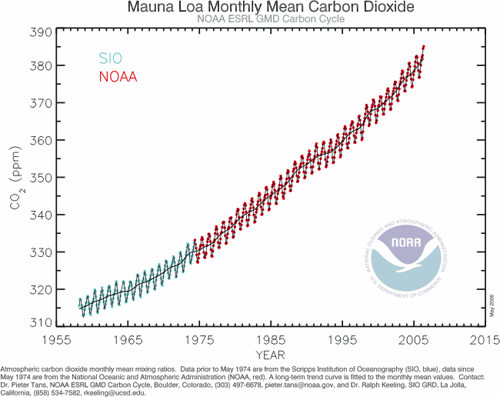| HONR228O: Carbon Cycle
and Climate Change Tuesdays 4:30 - 7 pm, Room: CSS 2428 Credits: 3 Prof. Ning Zeng, Dept. of Atmospheric and Oceanic Science and the Earth System Science Interdisciplinary Center http://www.atmos.umd.edu/~zeng/HONR228O |
 |
 |
| Outline
and content |
Professor's Work in Progress |
Readings | |
| Books,
Grading, Office Hours |
Homeworks |
Student Project Examples |
Climate change is a major challenge we face in the 21st century. What is the science behind the conclusions of the Nobel-prize winning International Panel on Climate Change? How can CO2, a trace gas in the atmosphere, have such a large influence on climate? Where does the carbon come from and where does it go? What can we do about the carbon and climate change problem?
This course will address these questions by introducing the fundamentals of the Earth's carbon cycle, a key biogeochemical cycle that controls Earth's climate and life. The course will focus on the changing characteristics of the carbon cycle on several timescales, ranging from geological, glacial-interglacial, interannual-interdecadal, and the more recent anthropogenic influence on carbon cycle and climate, as well as the future carbon-climate interaction in global warming scenarios. The carbon cycle in the atmosphere, land, ocean and the biosphere will be addressed. The underlying human activities such as fossil fuel burning and deforestation that are responsible for the increase in the atmospheric CO2 and our future options in dealing with the carbon problem such as alternative energy and carbon sequestration will be emphasized.
The course will consist of lectures, class discussions, student presentations, and projects. Discussion sessions will debate the current scientific, technological, economical or societal issues pertinent to climate change and carbon cycle. Readings and projects can be on any of these issues, including critiques on methods and novel ideas that may help us solve the CO2/climate problem. Back-of-envelope calculations will be emphasized to assess the order-of-magnitude of the problems, but more advanced techniques are also encouraged if you are willing to take on the challenge.
CORE: Interdisciplinary and Emerging Issues [IE]
